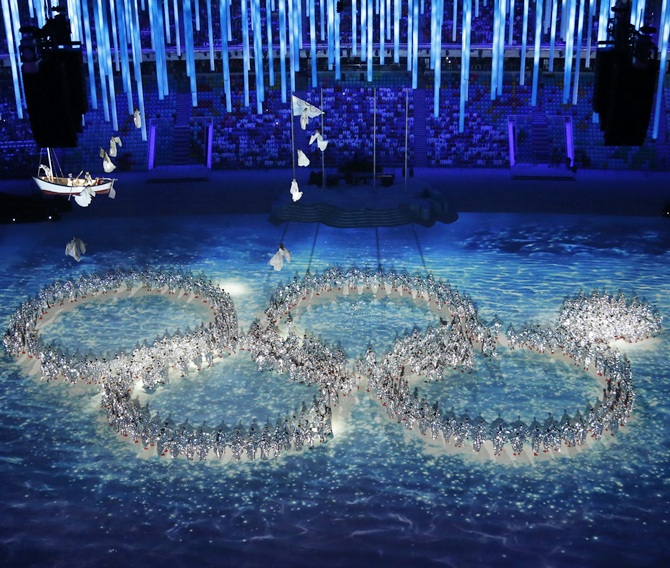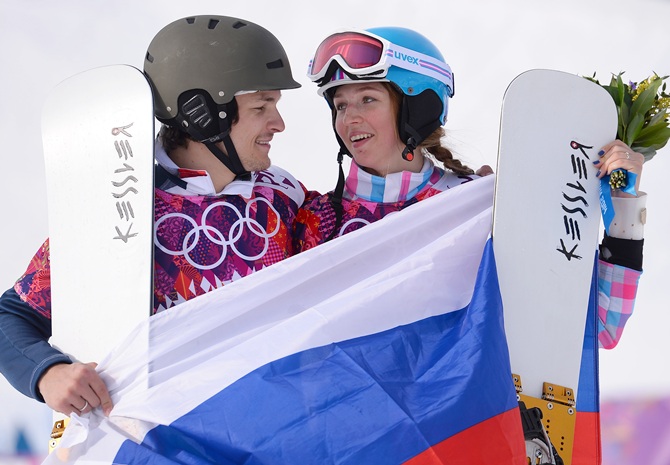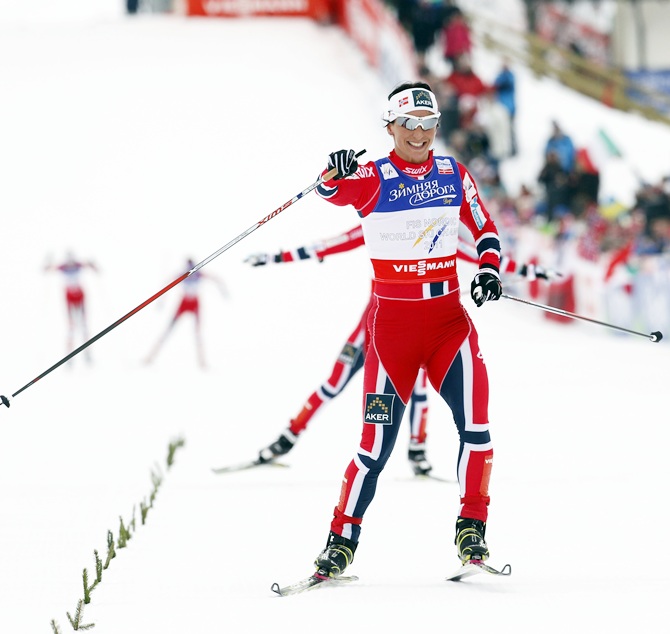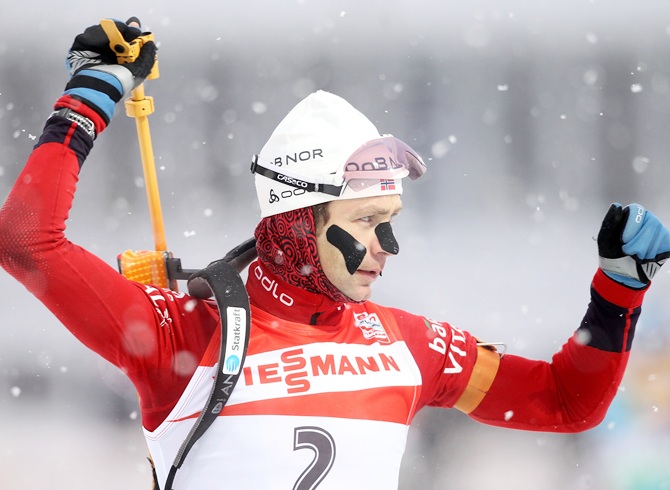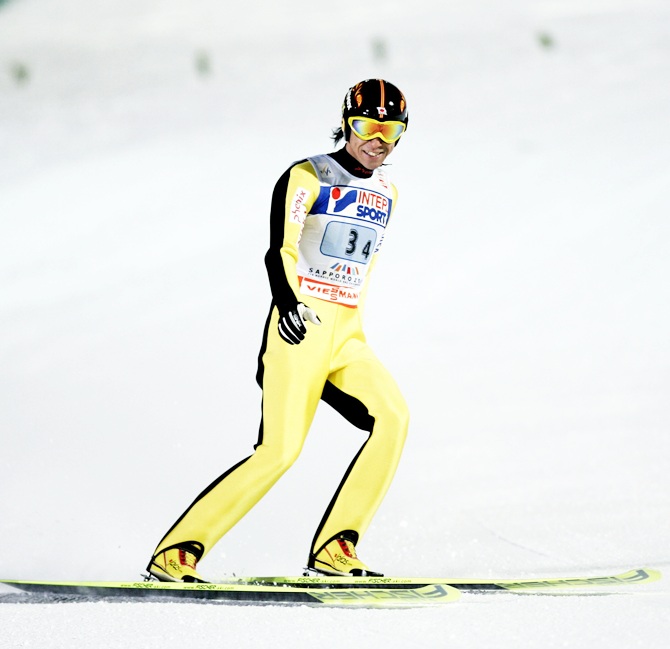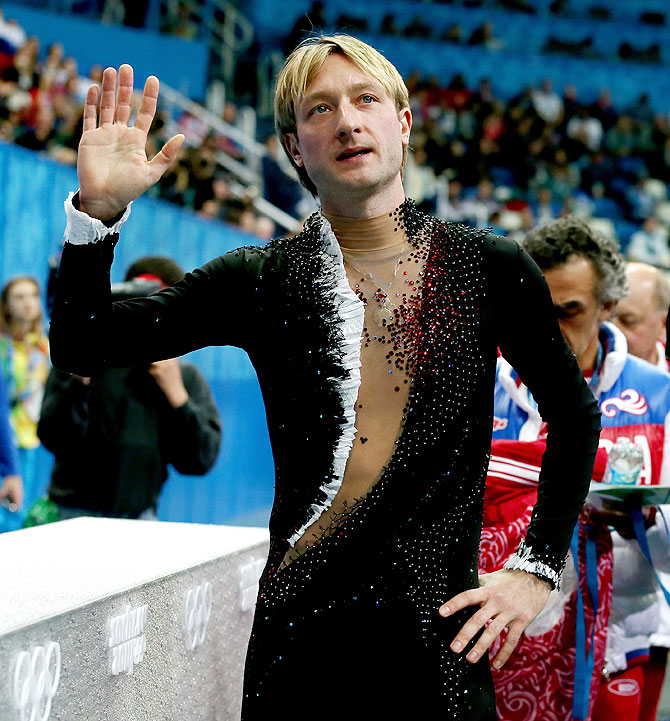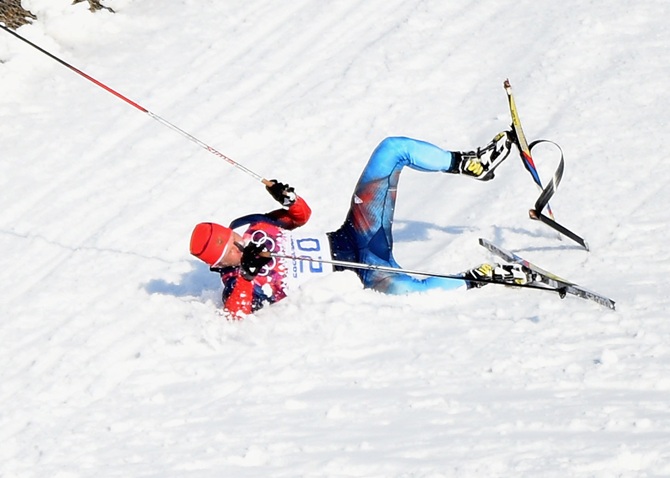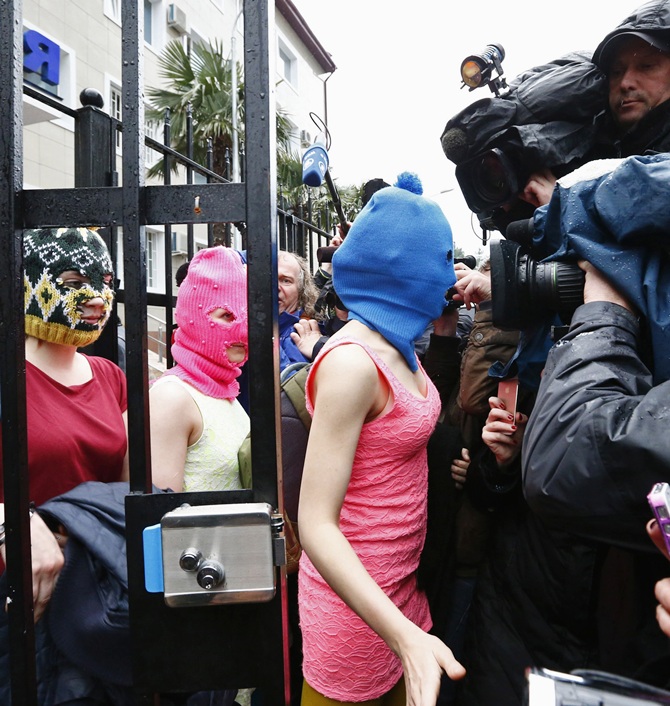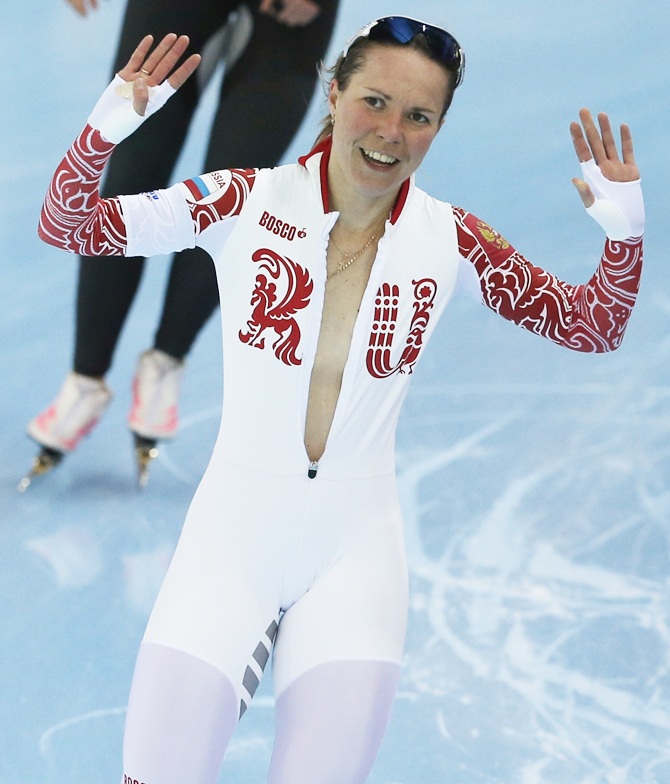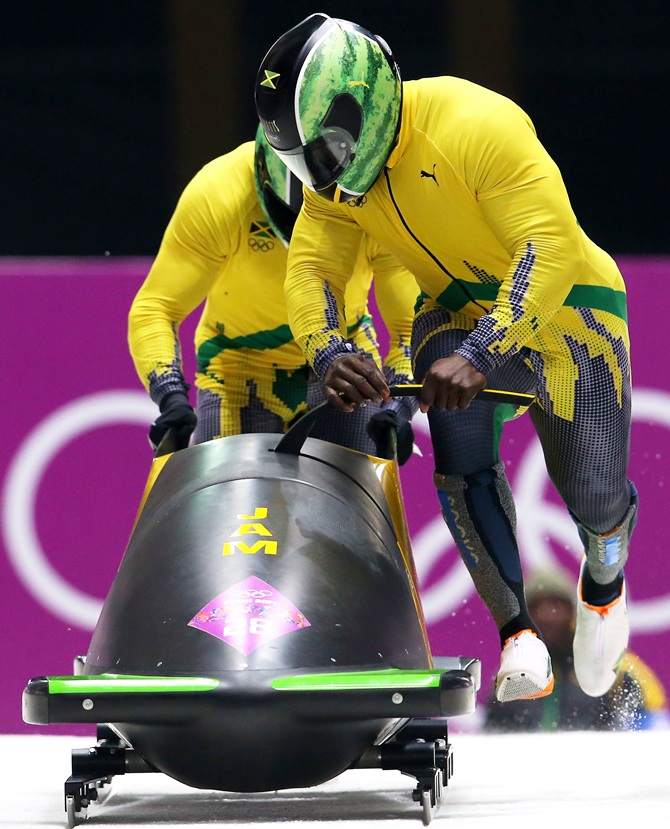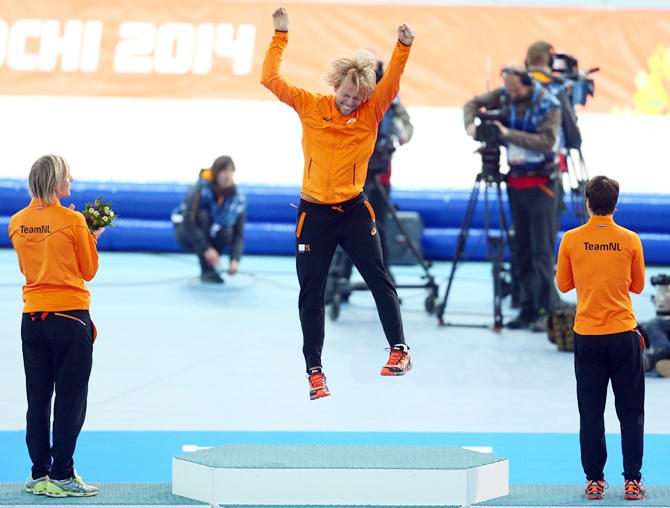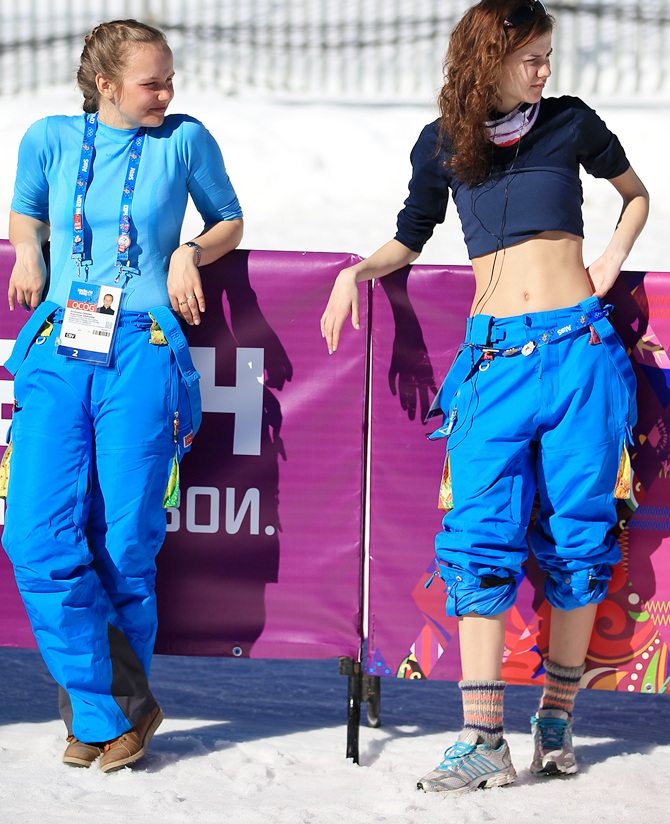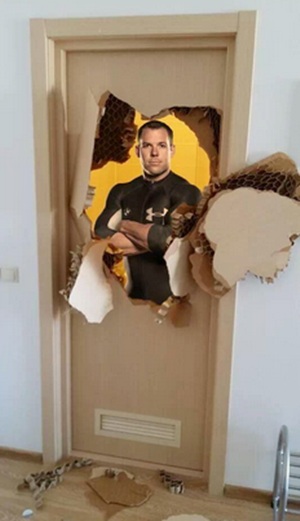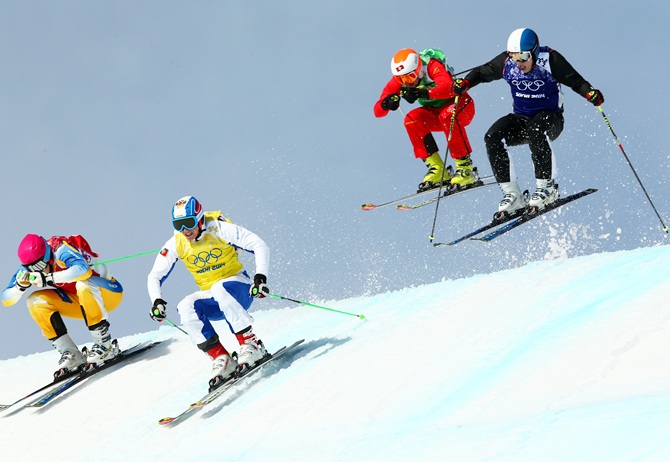 | « Back to article | Print this article |
15 Unforgettable moments from the Sochi Winter Olympics
For two weeks in Russia fans witnessed a number of inspiring stories. Some will go into future Games, while some represent the end of an era.
Now that the 2014 Winter Olympics have come to a close, Rediff.com brings you the moments from it that will be etched in memory.
Four Olympic rings
Russia will remain a very memorable host. The Sochi Olympics will always go in the same breath with its four Olympic rings.
One of the five rings that make up the Games' symbol failed to open. Five giant snowflake-shaped structures suspended from the roof of the Fisht Stadium, on the shores of the Black Sea in Sochi, were supposed to open into circles and then light up with pyrotechnics.
Russian organisers of the Games made a light-hearted joke at their own expense on Sunday when, at the closing ceremony, they referred back to the moment during the Opening ceremony when one of the five Olympic rings failed to unfurl.
After months of reports questioning Russia's readiness to host the Games the hosts spent $50 billion to produce, the country was determined to make a bold statement during the Opening ceremony at Fisht Stadium.
American turned Russian and wife win medals
There was thunderous applause from Russian fans, as Vic Wild, American-born snowboarder, won the gold medal for Russia.
Wild, 27, won his second snowboard gold at Sochi right after his Russian wife, Alena Zavarzina, took bronze in the women’s version of the same event.
He called his second gold medal “beyond believable".
Washington native Vic Wild says he wasn't getting the financial and logistical support he needed from the US Ski and Snowboard Association to continue in the sport, so the alpine snowboarder became a Russian citizen after marrying fellow-snowboarder Alena Zavarzina in 2011.
Wild's decision paid off!
Norway's Marit Bjoergen wins record sixth gold
Marit Bjoergen of Norway won a record sixth gold in the women's 30 km mass and sealed her status as one of the greatest Olympic athletes in history at the Sochi Olympics.
The Norwegian cross-country skier equalled the record of Soviet speed skater Lidia Skoblikova and Russian cross-country skier Lyubov Yegorova in taking six golds at a Winter Olympics, the most by any woman.
Most decorated Winter Games athlete
Ole Einar Bjoerndalen earned his 13th Olympic medal to become the most decorated Winter Games athlete when Norway won gold in the biathlon mixed relay.
Bjoerndalen, 40, beat the previous record he shared with compatriot and cross-country skier Bjorn Daehlie.
Kasai, oldest ski jumper to win an Olympic medal
Japan's Noriaki Kasai won a silver medal. The 41-year-old ski jumper was competing in a record seventh Winter Olympics but had never before won an individual medal.
Poland's Kamil Stoch snatched the men's large hill ski jumping gold medal from Japan's Noriaki Kasai, overhauling him with the last jump of the competition.
Kasai was just 1.3 points shy of beating Stoch in the individual large hill competition, which would have made him the oldest gold medalist in Winter Games history.
"It is hard to describe. What can I say? It is like a dream to me," Kasai, the oldest ski jumper to win an Olympic medal, told reporters after being cheered and applauded by a gaggle of excited Japanese TV crews.
"All these years I was disappointed by the Olympic Games. Today I just had to do it."
Kasai took silver in the individual large hill and bronze in the team event.
He said he plans to come back for his eighth Olympics in 2018.
Evgeny Plushenko's pull-out deflates home fans
Sochi was supposed to be Yevgeny Plushenko’s swansong.
Russia's flamboyant figure skater pulled out of the Winter Olympics through injury, in a shock twist that immediately deflated home fans.
Plushenko, a controversial selection for the Games because of the lack of competitive action in the build-up, won his fourth Olympic medal when he helped Russia triumph in the inaugural team competition.
There was disbelief when the announcement came over the public address system that the 31-year-old would not compete in the men's individual figure skating event after he injured himself during his warm-up.
True meaning of sportsmanship
Canadian coach Justin Wadsworth showed the true meaning of sportsmanship when he helped an opposing Russian skier finish a race after a bad crash.
Russian Anton Gafarov took a spill during a tricky turn in his cross-country sprint semi-final, and had badly damaging his ski.
Though already two minutes behind in a race that takes four minutes to complete, he was set on finishing.
Gafarov tumbled and limped his way through the course -- and then his ski snapped in half.
Wadsworth replaced Gafarov’s ski.
Pussy Riot to the fore
Russian protest group Pussy Riot used the games to their advantage to spread their message opposing President Putin’s reign.
Members of the all-women protest group Pussy Riot released a new music video criticising Russia's staging of the Winter Olympics and its human rights record, in a rare show of dissent during the Games.
The video, posted on the group's website, shows the women wearing trademark brightly coloured ski masks pulled down over their faces, and singing and playing instruments in front of the Olympic symbol.
It also includes clips from an incident on Wednesday in Sochi, where the February 7-23 Winter Games are being held, when Cossacks beat members of the group with a whip as they tried to perform a song beside a wall covered in the Sochi Games logos.
Maria Alyokhina and Nadezhda Tolokonnikova, two band members who were jailed until late December for a protest against Putin in a church, were involved in the video, called "Putin will teach you how to love the motherland."
Unzipped... the biggest roar went to Olga Graf!
On the ice, the biggest roar went to Olga Graf on Day 1, who finished a surprise third to give the host nation its first medal.
Russian speed skater Olga Graf ripped down the skin of her skin suit in delight after she won a bronze medal in the Olympic Games 3,000 metres.
When the 30-year-old speed skater raised her arms in triumph after crossing the finishing line, she pulled her zip down to her waist.
The tight skin burst open to reveal that she wasn't wearing any underwear.
Soon, Graf put her hand to her mouth in embarrassment and quickly zipped back her suit.
Cool Runnings
Jamaica's laid-back bobsleigh team, whose predecessors once inspired the Hollywood smash hit Cool Runnings, returned to the Olympics after a 12-year absence.
Despite vocal support from the crowd, pilot Winston Watts and brakeman Marvin Dixon finished second from the bottom at the Sochi sliding centre in their distinctive yellow, green and black sled.
Dutch speed skating delight
It wasn't so much a competition as a coronation for the Netherlands' speed skaters, who made off with 23 of the 36 medals on offer -- including eight golds from 12 events.
Michel Mulder 'lost' then won the men's 500 metres Olympic speed skating title by one hundredth of a second in a dramatic finale at the Adler Arena, with his twin brother Ronald taking bronze in another Dutch clean sweep of the medals.
Warm weather
A spell of mild winter weather disrupted events at the Olympics.
Competitors stripped down to T-shirts and shorts as the Sochi Games and basked in glorious spring weather that forced some minor rejigging of ski schedules.
The snow suffered as temperatures nudged 20 Celsius (68 degrees Fahrenheit) in the mountains. But it was dense fog that caused the biggest headache for organisers, forcing them to postpone some events.
Quinn's smashing time
When US Olympic bobsledder Johnny Quinn headed to Sochi, he had no idea he would end up trapped in a water closet.
Quinn became an instant Internet hit after he smashed through his jammed bathroom door, with a picture of his handiwork going viral.
Just two days later the accident-prone competitor found himself stuck in a lift on a media tour of the US networks to explain how he had managed to smash the gaping hole in the Sochi door.
Gold for grieving Ukraine
With their country wracked by violence, Ukraine raced to a famous victory in the women's team biathlon relay, dedicating their inspirational performance to a nation in grief.
Ukraine's anchorwoman Olena Pidhrushna was embraced in delight by her tearful teammates as she crossed the line.
"The girls did everything so that the blue and yellow (Ukrainian flag) would fly in Sochi and the national anthem of Ukraine would resound," Bubka said.
Photo finish
It was undignified but effective and one of the wildest finishes.
Russia's Egor Korotkov snatched a place in the men's ski cross semi-finals in a photo-finish after a three-way tumble for the line.
Korotkov's arm-stretch proved decisive as he slid across on his on his side, edging out Sweden's Victor Oehling Norberg and Jouni Pellinen of Finland, who were on their backs.
